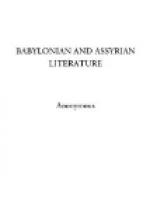[Additional clauses are found on the monolith inscription in the British Museum. They are not, however, of any great importance and amount to little more than directions for the preservation and reparation of the palace, with imprecations upon those who should at any time injure the buildings. On this same monolith is found an invocation to the great gods of the Assyrian Pantheon: namely, to Assur, Anu, Hea, Sin [the Moon], Merodach, Yav Jahve, Jah[?], Ninip, Nebo, Beltis, Nergal, Bel-Dagon, Samas [the Sun], Istar.]
[Footnote 1: Sivan.]
[Footnote 2: 878 B.C.]
[Footnote 3: Heb. “Tammuz,” Assyr. “Duwazu.”]
[Footnote 4: A city in Mesopotamia.]
[Footnote 5: “Burattu.” In Hebrew (Gen. ii. 14). “Phrat.”]
[Footnote 6: Dr. Oppert renders this “Anatho.”]
[Footnote 7: Literally, “from the face of.”]
[Footnote 8: Probably military engines used in sieges.]
[Footnote 9: Or, sadi-stone shining.]
[Footnote 10: “Kaldu.” There are fragments existing in the British Museum of a treaty made between this Nabu-bal-idin, King of Kardunias (Babylonia), and Shalmaneser, son of Assur-nasir-pal. v. “Trans. Soc. Bib. Archaeol.,” i. 77.]
[Footnote 11: The Hebrew Sivan.]
[Footnote 12: Literally, “impaled on stakes.” But Dr. Oppert and Mr. Norris generally adopt the rendering given in the text, I. 108, p. 194.]
[Footnote 13: It will be observed that this city is differently spelled in line 27. Irregularities of this kind are very frequent, especially in the termination of proper names.]
[Footnote 14: See note 3, p. 188.]
[Footnote 15: “Ahuni.” See l. 61, p. 191.]
[Footnote 16: The Hebrew Sivan.]
[Footnote 17: Or, “as it were situated among the storm-clouds of heaven.”]
[Footnote 18: The nature of these engines ("bilsi”) is uncertain.]
[Footnote 19: I.e., stony-hill.]
[Footnote 20: Or, lead.]
[Footnote 21: Possibly “humiliation,” from the Chaldee “rama.”]
[Footnote 22: Airu.]
[Footnote 23: Carchemish. Cf. Jeremiah xlvi. 2.]
[Footnote 24: Tribe(?).]
[Footnote 25: Or, lead.]
[Footnote 26: Some projecting ornament, like “horns of an altar.” Cf. Ps. cxviii. 27; Exod. xxx. 2.]
[Footnote 27: Probably some utensils, as explained by the Hebrew word “unutu” ("anioth").]
[Footnote 28: Or, with Mr. Norris, “the whole of it was not taken.” Dict., p. 558.]
[Footnote 29: The words specified are “sa” or “issa,” “passur,” and probably “ebony”; the others have not been identified.]
[Footnote 30: Probably “in ivory.”]
[Footnote 31: Labnana.]
[Footnote 32: Hazazi.]
[Footnote 33: Prince.]
[Footnote 34: The Inscription is here defaced.]




